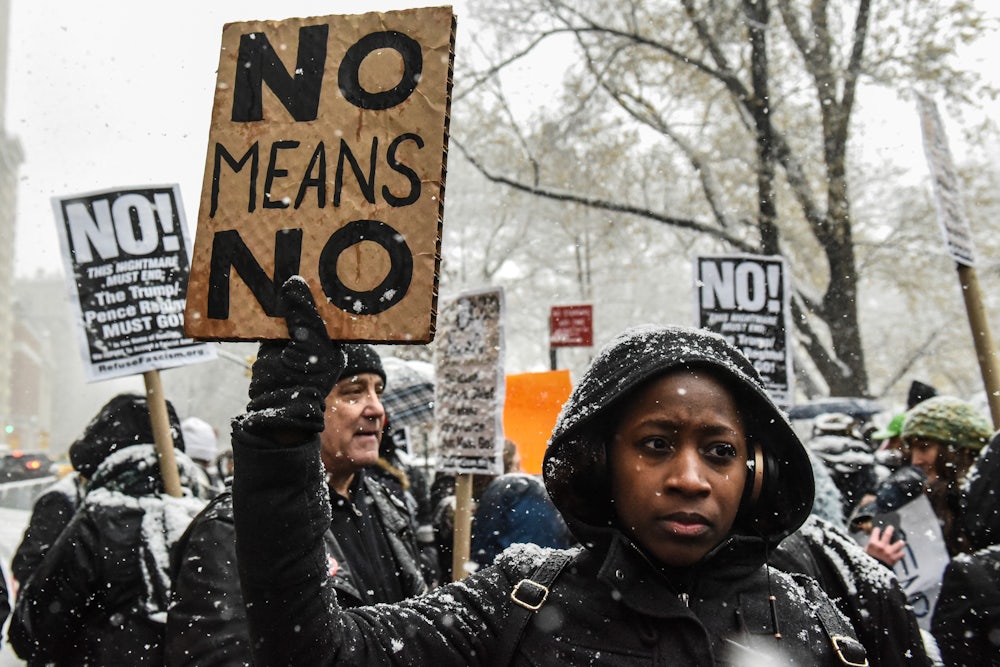A common complaint from critics of the #MeToo movement is that it has been taken over by a social media mob. “Twitter, especially, has energized the angry extremes of feminism in the same way it has energized Trump and his supporters: the loudest, angriest, most simplifying voices are elevated and rendered normal or mainstream,” Katie Roiphe writes in a new cover story for Harper’s. Roiphe has a specific term for these bullies: Twitter feminists. New York magazine’s Rebecca Traister is a Twitter feminist; n+1’s Dayna Tortorici is another. But even Roiphe’s small sample shows a group that is hardly monolithic when it comes to their politics. So what does it really mean to be a Twitter feminist?
Twitter has real flaws. It has indeed hosted excesses, in myriad debates that range far beyond the issue of sexual abuse. There are unfair pile-ons and harassment, ill-considered thoughts and hive-like behavior. It is also true that Twitter has an amplification effect; it is, after all, a platform dedicated to public speech. Roiphe is not the first commentator to have noticed this. Bret Stephens, another #MeToo skeptic, last year wrote in The New York Times, “Twitter doesn’t merely amplify ugliness. It erases nuance, coarsens thought, turns into a game of ‘Telephone’ in which original meaning becomes hopelessly garbled with every successive re-tweet. It also facilitates a form of self-righteous digital bullying and mob-like behavior that can wreck people’s lives.”
But whatever Twitter might be, it isn’t an ideology or a viewpoint or an argument. It is a vast collection of voices that reveals whatever critics of the #MeToo movement want it to reveal. A definition of Twitter feminism can be cherry-picked from a few heated tweets. To marry #MeToo to Twitter is a rhetorical sleight-of-hand: After all, if Twitter is full of crazy people, there’s no need to engage seriously with anything they say, since their critiques are mere invective. #MeToo is diminished by virtue of its digital character, while its critics can present themselves as victims and lonesome truth-tellers.
In response to #MeToo, critics like Roiphe, Andrew Sullivan, Caitlin Flanagan, and others have articulated several objections: that we’re moving too fast to be careful, that some women’s complaints are trivial, that their demands are unnecessarily punitive. As Traister noted in a piece at The Cut, these objections are not rare or endangered, but quite common. They are on the cover of Harper’s and featured in The Atlantic, The New York Times, and Traister’s own New York. Far from mainstreaming the supposedly simplistic and deranged voices on Twitter, some of the most powerful media organs in this country are publishing diverse opinions on this subject.
But let’s take those objections one by one, and see whether they really do apply to those who support the #MeToo movement. In fact, few people think that false rape accusations are impossible, or that weird DMs are just like groping, or that we ought to ignore due process. You would be pressed indeed to find any serious writer making these arguments. If guilt is sometimes presumed, it is because the opposite dynamic has been in effect for centuries, allowing men to get away with abuses large and small that wrecked countless people’s lives more tangibly than a Twitter ratio count. The norms that we live under are corrupt, and any campaign to change them carries some of that corruption.
#MeToo’s supporters understand its limitations and flaws; a person can believe women without surrendering all critical thought. That so many of the movement’s critics accuse supporters of the opposite—of fanaticism, bordering on the familiar accusations of hysteria and irrationality—reveals more about their politics than the politics of their targets. “It’s another tic of the powerful to understand anger at oppression as insensible violence, to mistake tweets for rocks,” Traister noted.
If #MeToo alarms you or rubs you the wrong way, Twitter is convenient. People tend to be hyperbolic there, and when a public conversation coalesces on Twitter it’s easy to dismiss it as so much herdthink. But before we diminish a movement, we should ask a number of questions: Why are people so angry? Why do they feel so unrepresented, and why is their rhetoric so shrill? Is it because the rabble naturally tend toward mob-like behaviour, requiring cooler, more enlightened heads like Roiphe to intercede? Or is it actually because they have been silenced for so long?
Attacking the platform invokes the inaccurate stereotype that the #MeToo conflict is a generational one, pitting second against third wave. Worse, it is a means to avoid serious intellectual engagement. If your critics are social media hysterics, you hardly need to take them seriously. Nobody can argue with a mob. This dismissiveness doesn’t create a more open space to discuss sexual violence. It prohibits, it quiets, it shuts down. Intentionally or not, that acts as a defense of the status quo. If #MeToo errs by running hot, its critics err by being too conservative, and by buttressing existing power structures in the process.
Twitter’s most redeeming qualities are its democratic possibilities. It can be an equalizing force. If people use it to demand change, it’s because they don’t have much else available to them. If they’re shrill, perhaps it’s because that’s what it takes to be heard. The fight against sexual violence is a bid to change the way we think, the way we act toward each other. If #MeToo made no one uncomfortable, it would be doomed.
